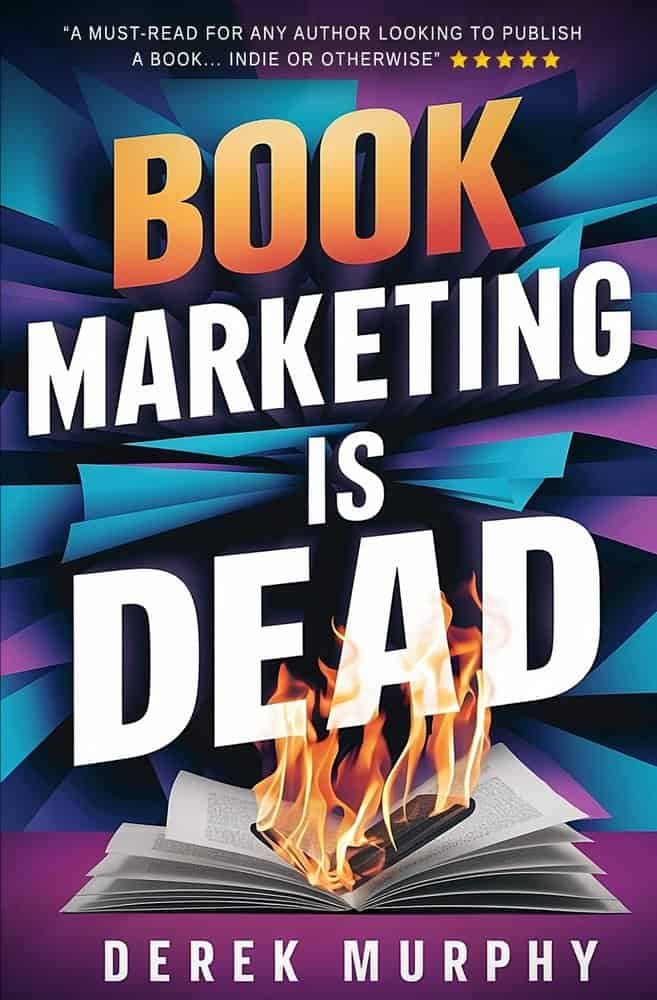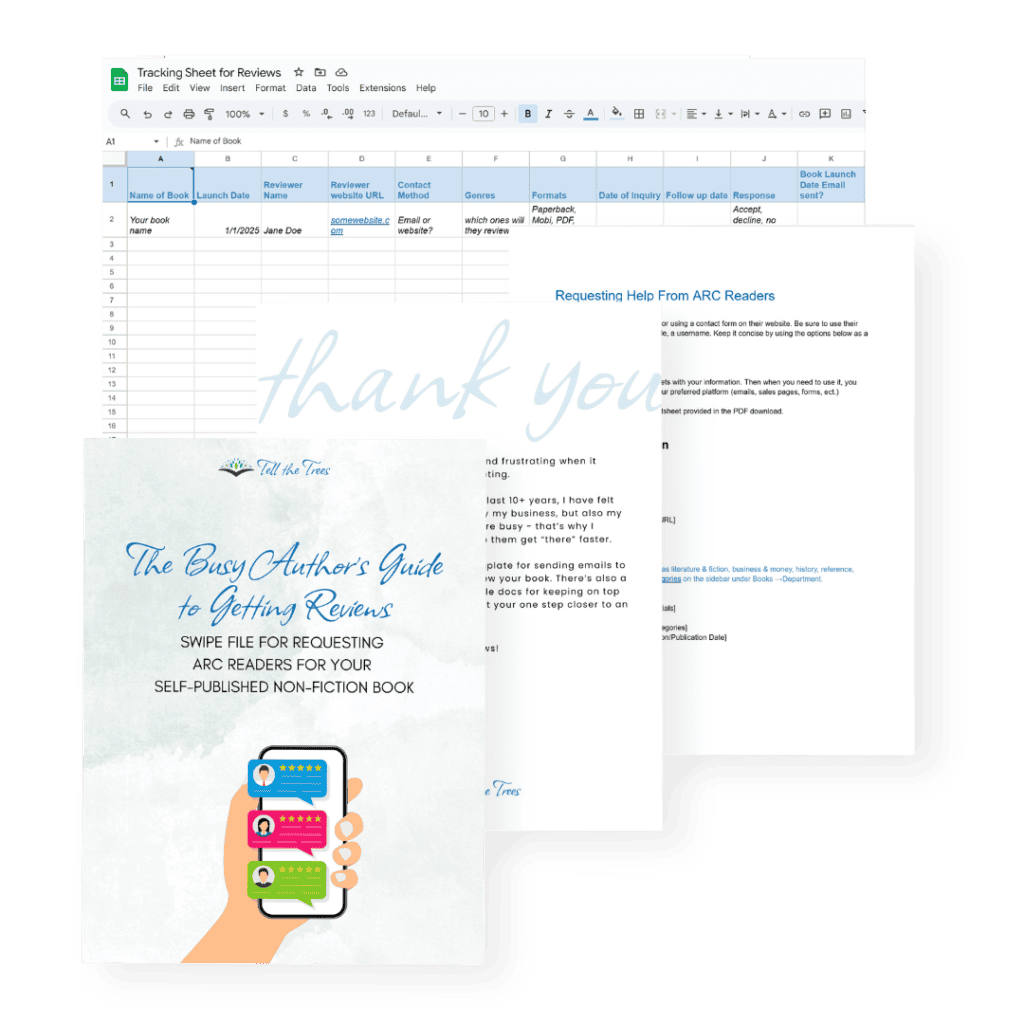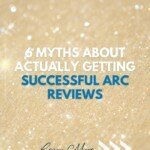by Michelle
Share
by Michelle
Share

Are you mystified about ARC Reviews?
Wondering how to use ARC Reviewers the right way on Amazon?
Maybe you’ve tried it and had confusing results. Or maybe you are new to this whole author thing and aren’t sure about ARC Reviews.
Keep reading or watch the video.
What are ARCs and ARC Reviews?
As a refresher, ARC stands for Advanced Reader Copy.
It’s standard in publishing to give out advance copies of your book and let the readers you select read the book before launching it. Then on launch day, you ask those readers to kindly leave a review.
Reviews can make or break your book. Too little and no one will want to even look at your book. Even a few terrible ratings can still get your book read.
Getting ARC Readers is a ton of work, so you might be wondering: Why can’t we just sell our books and hope for reviews?
I’ve asked myself that question as well. I’ve learned that book readers aren’t necessarily book reviewers.

Book Marketing is Dead by Derek Murphy
In Derek Murphy’s book, Book Marketing is Dead, he says this about reviews:
We’d all like to get natural reviews from the people who buy our books, but only about 5% of book buyers leave reviews, and many people only leave reviews if they love or hate the book. That means you’d have to sell 100 books to get 5 reviews…
It might seem discouraging to authors that readers likely won’t leave a review.
That’s why ARC Readers are important to use when launching your book.
When researching ARC Readers, you might come across warnings about using ARC Reviews.
I wanted to clear up the confusion not only for myself, but for anyone else realizing the contradictory information out there.
This post covers 6 myths that I’ve discovered and the truth about each one.
Myth #1: You need hundreds of ARC Reviewers
There’s no question that you need ARC reviews to increase your reviews.
But do you need hundreds?
There is one train of thought that says to give out 100 free books and hope some of those convert into reviews.
But the truth probably is that you can get away with 10-50 ARC Readers and still find success. Not to mention, if you can get at least 10 reviews on your books, it will show up more often on Amazon. Running ads is another option, but you need reviews to make those ads successful.
It’s more important to focus on the right reviewers, not the number.
Look for reviewers who:
- Are genuinely interested in your book’s genre
- Have a track record of leaving thoughtful reviews
- Will actually read and review within your timeframe
- Can provide honest and constructive feedback
You can also use BookSirens and filter by category (genre). Just be sure to research the best reviewers so you don’t waste your time.
Myth #2: ARC Reviewers are guaranteed to review your book
When I was reaching out looking for reviews, I made the mistake of using a Goodreads forum and posted a request. I was inundated with book reviewers asking to review my book for payment. I immediately declined these offers.
The main reason that I don’t want to pay for reviews is that Amazon is not a fan of this kind of exchange. They want honest reviews, not reviews that were compensated. I’ll get into this a bit more in the next section, but note that reviewers should be on the up and up. A free book is fine. Getting paid is not.
Melanie Rockett, an author of twenty-six books, writes on her website:
Even though you are looking for reviews in order to sell your books, the reviewers are NOT writing the review to help you sell your book. They are writing the review in order to help potential purchasers make a decision. They PRIDE themselves on writing honest reviews. This means that you may get a variety of reviews from five-star fabulous to one-star show-stoppers.
She also includes a list of what not to ask from reviewers:
- Do not expect anything
- Do not ask for a positive review
- Do not ask for a review on a specific date
- Do not offer to pay for a review
- Do not bug the reviewer
- Do not ask the reviewer to revise their review
- Do not comment on your own reviews
There is one thing I will note from this list of “do not’s” and that it’s ok to email your reviewer and remind them of your launch date and it’s also ok to let them know when you’d like the review. You cannot expect them, however, to abide by your specific asks. You can simply hope they’ll review your book. But there’s no guarantee that they WILL review your book. All you can do is ask.

Good authors use ARC Readers
Myth #3: Giving away free books for ARC Readers is illegal
As mentioned in the beginning of this article, ARCs are common in the publishing world. However, there are some authors who believe this is unethical. One such author, Mark Horrell is quoted in an opinion article, “Why Giving Readers Free Books for Reviews is Unethical”. He states:
…almost all my reviews are organic, written by complete strangers who have picked up my books, enjoyed them, and been kind enough to leave feedback for others.
I cringed at this quote.
Well, that’s great for you, Mark. But not everyone is so lucky to get organic reviews.
As one commenter stated, “Indie authors who want to make life more difficult for themselves by maintaining an ethical standard that doesn’t apply to anyone else in the industry are choosing to shoot themselves in the foot.”
I give you permission, for whatever that’s worth, to give away your book to ARC Readers. And so does Amazon.
Mark did mention that he does two things to make this happen. It might be a good experiment to try doing this if you want to risk not using ARC Reviews. (1) He uses a friendly request at the back of each of his books, and (2) when he writes on his blog about writing, he leaves a note at the end of the post asking to leave a review. He doesn’t ask family or friends for reviews.
The quoted article, though, is not accurate because it goes on to say that Amazon considers a free book a financial reward. But that’s simply not reality.
If you read Amazon’s Guidelines, you’ll notice that Amazon doesn’t allow compensation for reviews. However, they specifically mention ARC copies:
It’s ok to review a free or discounted book (advanced reader copy) that you received from the author or publisher. However, they can’t require a review in exchange or try to influence the review…
Note that word “require”.
You can’t require your reviewers to review your book.
Again, all you can do is ask and hope they will.
Myth #4: ARC Reviews must be 5 stars
We all want our books to be 5-star books, but guess what happens when you only have 5-star reviews? It screams “I’m a fake!”
Don’t believe me?
I’ve seen many authors write about this and they even suggest having a mix of negative and positive reviews, which is a relief, right?

We can’t control how others perceive our books. But ONLY having 5-star reviews seems unreal. There’s a lot of negativity online, so it seems odd that you only have raving fans and no enemies. Have you read Amazon or Goodreads reviews? Most of them are critical with a mix of good reviews. That’s humanity for you.
Tara Sparling writes about this on her website in an article called “Why 5-Star Reviews are Utter Rubbish” (gotta love this title!):
5-star reviews are all very well for truly exceptional books—I’m obviously not dismissing them entirely. And it’s all very well to award 5 stars to a deserving book which has been edited, polished and painfully abraded by an angle-grinder.
However, just yet, 4 stars should be thumbs up enough to the vast majority of decent fiction. And much as we all love the gloriously Democratic State of Self-Publishing, we’re not there yet, folks. Especially the unedited stuff. I feel more comfortable with 4-star reviews, especially if they have just a tiny bit of negative comment in them, because they feel more discerning. And more honest.
Isn’t it silly how we, as authors, hang our emotional well-being on a tiny star icon? Even if you get some negative reviews, your book is still being read. And that’s the best thing to realize about your reviews. It symbolizes that someone out there read your book. Be happy about that.
Don’t expect your ARC Readers to give you 5-stars. Having reviewed books (in a previous life) for BookSneeze, Tyndale, and Net Galley, I can say most of us are not in the business of flattering authors. I know I probably irritated an author or two before I became an author myself.
Reviewers read books and give an honest review of the book. That’s all you can hope for in the world of self-publishing.
Myth #5: ARC reviews get removed on Amazon
Amazon has and will remove reviews they think are fraudulent or unethical.
In their Community Guidelines, they state:
Reviews should reflect your honest opinion. We don’t allow reviews that are created, edited, or removed in exchange for compensation. Compensation includes cash, discounts, free products, gift cards, and refunds.
Reviews will only get removed if it violates Amazon’s guidelines, which consists of
- plagiarized material
- comments about pricing, availability, or order/shipping feedback only
- Repetitive spam or pictures created with symbols
- Private information, such as phone numbers, email addresses, license plate numbers, and so forth
- profanity or harassment, hate speech
- sexual content
- external links
In addition, Amazon doesn’t allow these types of reviews:
- A review by someone who has a direct or indirect financial interest in the product.
- A review by someone perceived to have a close personal relationship with the product’s owner, author, or artist.
- A review by the product manufacturer, posing as an unbiased shopper.
- Multiple negative reviews for the same product from one customer.
- A review in exchange for monetary reward.
- A review of a game in exchange for bonus in-game credits.
- A negative review from a seller on a competitor’s product.
- A positive review from an artist on a peer’s album in exchange for receiving a positive review from them.
While Amazon states they’ll remove reviews from friends and family, they aren’t always consistent with this. In that case, I say ask for those reviews from them. Worst case, they’ll get removed.
Also, reviewers must have spent $50 on Amazon.com using a debit or credit card in the last 12 months to be eligible to leave reviews. If not, they won’t be able to review your book.
Overall, Amazon will only remove your reviews if they don’t abide by the above guidelines.
Myth #6: You can only use ARC reviews before launching your book
Melanie Rocket from The Writing Cooperative wrote an article, “How Do Some Authors Get HUNDREDS of Reviews, While Others Get Nothing?” In the article, Melanie suggests you must continue getting reviews for the lifetime of your book.
While I wholeheartedly agree that reviews should continue, I think there’s more to it than just getting reviews trickling in.

ARC Readers are usually happy to read your book
I like how Derek Murphy phrases the marketing journey with your book:
No matter what kind of marketing you do, that marketing with bring people back to Amazon or your website and based on what you’ve got posted, they’ll decide whether or not to buy the book.
While reviews matter—your author platform can compensate for a lack of reviews or too few reviews.
Maybe a mix of both is a winning combo.
To understand this better, it might be helpful to see how other people read books and view the author platform.
Michael Hyatt writes about his 10 practices when he reads non-fiction books. Surprisingly, most people don’t read books front to back, but find the information they need and interact with it. He states,
- Don’t feel that you need to finish. Not to be cynical, but most books aren’t worth finishing. I read until I lose interest. Then I move onto the next book. This is the secret to reading more. I also listen carefully to what my friends recommend. If they suggest a book, I am more likely to like it—and finish it.
- Start with the author bio. Every book flows out of an author’s heart and mind. I want to know something about the person I am going to be spending the next several hours with. Usually, the bio in the book is enough, but often I will Google the author before I start reading. (italics emphasis is mine)
If you want to be a dynamo, you need to have an online presence, not just reviews.
As a side note, I especially like this tip from him:
Share the book’s message. As we say on Thomas Nelson’s BookSneeze.com site, “great books are contagious.” They are meant to be shared. I blog about them, teach them to others, and buy multiple copies to give away to friends and colleagues. This is one way to ensure that the message lives on—and is passed on.
When it comes to your book, imagine the effect of both your author platform and reviews. Consider it a wise investment to do both.
Final Thoughts on ARC Reviews
There is a ton of advice about ARC Reviews online. Most of it is simply opinions. If you really want to know if something is allowed, go to the source. Amazon keeps its guidelines up-to-date.
With that said, it isn’t a bad idea to leave a page in the back of your book with a request for reviews or even mention it on a blog post. There are always ways to ask politely for reviews. Since we want those reviews to continue to come in, why not use your author platform, email list, and book to keep the momentum going? And if you want to try it, asking friends and family is ok too. Just note that if Amazon takes notice of your relationship, they might remove it. It never hurts to try, though!
Our books are our livelihood, so instead of dismissing everything as “bad”, look for the “ins” that Amazon allows. If they don’t specifically say NO to something, then try it. Always be honest and truthful and expect the same from your reviewers. Don’t ask friends and family for 5-star reviews. Tell them it’s ok to give you an honest review.
ARC Readers will help your book with advertising and sales, but your author platform can help too. Reviews are just one piece of the puzzle in your marketing efforts.
Free Swipe File Download
Do you struggle with reaching out to ARC Readers?
Want a swipe file of the emails I use to reach out to ARC Readers?
Grab the free resource by signing up to my email list. Included is a free tracking sheet.
Copy the text, paste it in your own emails or marketing materials with your information, and send to your ARC Reviewers. It’s that easy!
Just sign up and get it free!

Tell the Trees is supported by its readers. When you make a purchase using links on this site, it may result in affiliate commission. Please visit my affiliate disclosure page for more information.
Let's Discuss It
The EU Accessibility Act officially kicked in on June 28, 2025, and that means it's being enforced right now. Here's what to expect for self-publishing.
Sometimes what we call perfectionism is just fear of rejection in disguise. We keep our work hidden because putting it out there means people can judge it.
Ever wonder why some books take off with book sales while others collect digital dust? When it comes to book marketing, I’ve noticed the same problems pop up again and again. Let me walk you through a real example that perfectly illustrates what NOT to do—and more importantly, how to fix it. The Post &
D2D for print books will not replace Amazon KDP for most authors—the royalty difference is just too significant if you're primarily selling direct to consumers online. But it's not supposed to replace Amazon; it's supposed to complement it.












This is a super useful article. thank you.